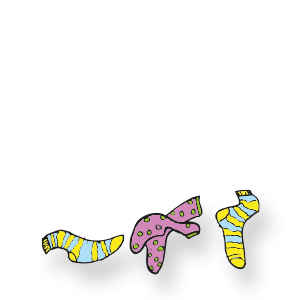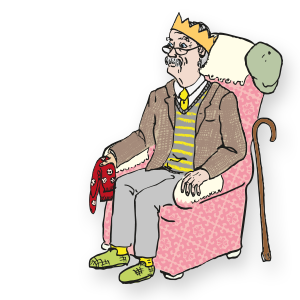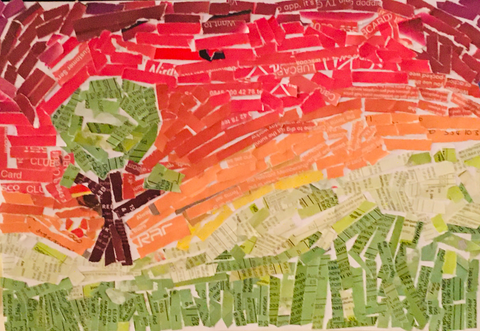

Uncertain about uncertainty…

Written by Deborah Stephenson
“When nothing is sure, everything is possible.” - Margaret Drabble
Every January, as we pack our Christmas decorations away for another year, I find myself silently wondering what will have happened by the time we get them out again. This moment happens to me every year, like a fixed point in time… a measure of past and future.
Usually, as I take down the tinsel and wind up the fairy lights, I feel a curious anticipation about the year ahead mixed with a little apprehension and a little excitement, but last week, as I wrapped up the baubles, I found myself wondering what I might have felt this time last year, had I known what the next 12 months would bring, and just how uncertain the future can be.
Taking down the decorations is a trip down memory lane. Back into the box go the tiny gold bells I got for the tree in my first flat, and the nativity scene I bought with my Mum at a Christmas market - little figures carved into a piece of smooth wood. A fat and feathery robin, made by my daughter for school, tucks in beside a large pale blue bauble that my son got for his first Christmas 13 years ago now!
I gather up the handprint trees I made with the children when they were little, and think about how much they have grown up since we made them. At the time we made and bought all these decorations, I couldn’t possibly have imagined everything that has happened since. It is a reminder that we have always faced uncertainty, and despite the current situation, the future is no more or less uncertain than before. We cannot predict what will happen… as last year proved in spades.
The problem is that uncertainty plants the seeds of concern and worry. Humans instinctively to want to be safe, and we want those around us to be safe too - uncertainty feels unsafe. Worrying is a tool we use to try to overcome that uncertainty and take back control, but a continual quest for certainty or a constant feeling of being at risk deprives us from feeling stability or enjoyment in the present, and is exhausting and damaging.
Issues arise when the worry becomes bigger than the problem. We tell ourselves that if we scrutinise a problem for long enough and work out every possibility of everything that might happen, we might come up with a solution, or at least we will be prepared for the worst case scenario (I definitely do this!), but seeds that are well tended, grow quickly, and the fruits of concern and worry, are anxiety and fear.
All this raises our levels of the stress hormone cortisol which, while useful in small doses, can lead to high blood pressure, sleeplessness, anxiety, depression, an inability to concentrate, and suppression of the immune system.
So what can we do?
One idea I read which I particularly like is to Note, Challenge and Change… So when we notice our thought and recognise it as a worry, challenge it… ask “do I really know that?”, “Are there other outcomes here?”. What would you tell a friend if they said that to you? Then change the thought - the worst case scenario is not the only scenario, what better things might happen? Balance thoughts of worst possible outcomes with thoughts of best possible outcomes. Remind yourself that you have always faced uncertainty, you are flexible, and you have made it through bad times before.
Plant fewer worry seeds, try to keep them in one area, don’t scatter them around. There is no need to constantly return to them or tend them - instead, look after the other flowers and help them to thrive instead. Grow a symbiotic garden planting seeds of hope and strength next to worry and concern. When you can… take the shears to the worry plants and cut them right back… give the positive ones more space to grow.
And there’s something else too…
There are some very real concerns about the impact this current situation will have on our children in the future. Undoubtably it will affect them in many different ways, and we need to support them well, but I also wonder whether, through this, some of them will cultivate a more helpful and resilient attitude to uncertainty?
I’ve already noticed in my own children a greater acceptance of disappointment, worries, return to lockdown, isolation from friends and family, and change after change after change. Yes there are upsets and wobbles and it’s not all plain sailing, but I am full of admiration for their increasing ability to just get on with things in a way they would not have done before.
I am sure it is the same for many young people, and I like to hope that maybe in the future, when our children are older and are putting their own Christmas decorations away, they can look forward to a new year comfortable with the uncertainty it brings and that something positive will have grown from this current situation.
I hope so.
And I leave you with this from one of my favourite experts, David Spiegelhalter, who holds the fantastic role of Professor of Public Understanding of Risk at Cambridge University “… just because we don't know everything, does not mean we don't know anything. So I think the take-home message is that we should be clear what we do know, and then proclaim our uncertainty with confidence.”
Deborah Stephenson, soon to be Ollie Coach
I am an Ollie School trainee and a Director at an Independent Prep School for boys. I am a trained journalist and worked in BBC Local Radio for more than twenty years as a reporter, bulletin reader, news editor and programme maker. It was a great job, but I wanted to do something to support my own children’s wellbeing with a view to taking that on to support others and, in pursuit of a better work life balance, I resigned as the Assistant Editor of BBC Essex last year. Inspired by the Ollie School concept I was excited to be accepted for the training course and it has been a fascinating and enlightening and journey so far.
To get in contact with Deborah, email info@ollieandhissuperpowers.com

